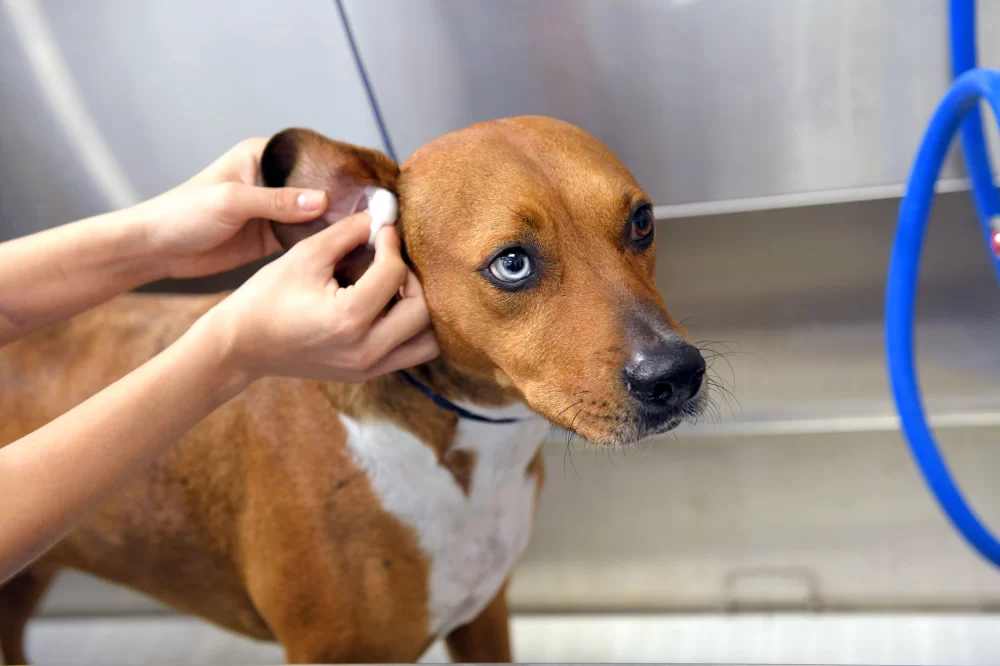- Why Ear Health is Crucial for Your Pet
- Common Ear Issues in Pets
- How to Clean Your Pet’s Ears Safely
- Signs of Ear Infections and When to Seek Help
- Preventing Ear Problems in Pets
- Ear Care for Different Breeds
Why Ear Health is Crucial for Your Pet
Your pet’s ears are vital for their overall health, yet ear care is often overlooked. Keeping your pet’s ears healthy is important not only for their comfort but also to prevent potential health issues such as infections, irritations, or hearing loss. Pets, especially dogs and cats, are prone to ear problems due to the unique shape of their ears and their tendency to explore their environments.
Regular ear care is a simple way to ensure your pet’s comfort and prevent costly medical issues down the line. By focusing on your pet’s ear hygiene, you can maintain their quality of life and avoid the hassle of dealing with painful and persistent ear conditions.
Common Ear Issues in Pets
There are several common ear problems that pets, especially dogs, face. Some of the most frequent issues include:
1. Ear Infections: Ear infections are one of the most common issues, often caused by bacteria, yeast, or allergies. Signs of an infection include redness, swelling, discharge, or foul odor from the ears.
2. Ear Mites: These tiny parasites can cause irritation, itching, and inflammation. Ear mites are more common in cats and often require veterinary treatment for elimination.
3. Allergies: Allergies to food, pollen, or environmental factors can contribute to ear issues. Allergic reactions may lead to itching, inflammation, and infections.
4. Wax Buildup: Excess ear wax can lead to discomfort and even infections. It’s important to monitor for excessive buildup and clean your pet’s ears regularly.
How to Clean Your Pet’s Ears Safely
Cleaning your pet’s ears should be done regularly as part of their grooming routine. Here’s how you can clean their ears safely:
1. Gather the Right Supplies: You will need ear cleaning solution recommended by your veterinarian, cotton balls, and possibly a towel to catch any mess.
2. Examine the Ears First: Before cleaning, gently inspect the ears for signs of infection, redness, or foul odor. If you notice any issues, consult your veterinarian before proceeding with cleaning.
3. Apply the Ear Cleaner: Gently lift your pet’s ear and apply a small amount of ear cleaning solution into the ear canal. Massage the base of the ear to distribute the solution and loosen debris. Avoid pushing anything into the ear canal.
4. Wipe the Ear: Use a cotton ball to gently wipe away the excess ear cleaner and any visible debris from the outer part of the ear. Be cautious not to go too deep into the ear canal.
5. Reward Your Pet: After cleaning, offer your pet a treat or praise for being cooperative. This positive reinforcement helps make future ear cleaning sessions easier.
Signs of Ear Infections and When to Seek Help
Ear infections are not uncommon in pets, but it's important to know the signs so you can address the issue before it worsens. Look out for these symptoms:
1. Scratching or Rubbing the Ears: If your pet is scratching at their ears more than usual or rubbing their ears on furniture or the floor, it could be a sign of discomfort or infection.
2. Excessive Wax or Discharge: If you notice brown, yellow, or foul-smelling discharge coming from the ears, it may indicate an infection or yeast buildup.
3. Redness or Swelling: The inside of the ear should be pink, not red or inflamed. If you notice unusual redness or swelling, contact your vet.
4. Head Tilting or Loss of Balance: In severe cases, ear infections can affect your pet’s balance. If your pet tilts their head or seems disoriented, consult a vet as soon as possible.
Early detection of ear problems can save your pet from prolonged discomfort. If you notice any of the above symptoms, take your pet to the veterinarian for a thorough examination and proper treatment.
Preventing Ear Problems in Pets
Prevention is key when it comes to keeping your pet’s ears healthy. Here are some tips to help reduce the risk of ear issues:
1. Keep Ears Dry: Moisture can promote the growth of bacteria and yeast in the ears. After your pet swims or bathes, make sure to dry their ears thoroughly with a soft towel.
2. Regular Ear Cleaning: Clean your pet’s ears regularly, especially if they are prone to wax buildup or infections. The frequency of cleaning will depend on your pet’s breed and lifestyle.
3. Avoid Using Cotton Swabs: Never insert cotton swabs into your pet’s ear canal, as this can push debris further in and cause injury or infection.
4. Regular Vet Checkups: Annual checkups will help catch ear problems early. Your vet can give you personalized advice on ear care based on your pet's health history and breed.
Ear Care for Different Breeds
Some pets are more prone to ear issues due to their breed or ear shape. For example, breeds with floppy ears, such as Cocker Spaniels or Basset Hounds, are more likely to experience ear infections because their ears trap moisture and heat. On the other hand, pets with upright ears, like German Shepherds or cats, may still face issues like wax buildup but tend to have fewer infections.
It’s important to adjust your ear care routine based on your pet’s breed and lifestyle. Pets with floppy ears may require more frequent cleaning, while pets with sensitive skin may need special ear cleaners to prevent irritation. Always consult your veterinarian to determine the best ear care routine for your specific pet.
At Hidden Brook Veterinary, we offer comprehensive ear care solutions tailored to your pet’s needs. Whether you’re looking for advice on cleaning or managing recurring ear infections, our expert team is here to help.












